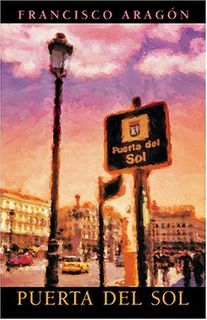
So much of that writing and thinking took place here, it seems appropriate to post it now that it is, at last, elsewhere from my desk.
*
Was it for this that I
A ghostword is an accident, a non-word that crosses into the dictionary through typographical oversight or misinterpretation. Rarely, it slips into usage, bastard imposter, and assumes a legitimacy of its own, but then it no longer passes nonsense for matter. It is an actualized fiction. Like other words in the language net, it takes on meaning. It crosses meaning. It is my fantasy.
In my nightmare, we have to find the right words. We were crossing
but the fairgrounds went a long way out, so I began walking. I began talking to you, cousins. For this, someone left a body in the grass, human, pale, thin as a gazelle and socket-eyed and you looked away, back towards where we came. This side, the glass in the sun, the drowned rising against the bank, the river crossing through so many middle-Americas—for what? The bodies stared into us and nothing, cousins. We were crossing
In my family, words were hard but dear, were both hard-won passage and long-suffering monument. Words authorized the way. They named the only boy, my brother, after Saint Christopher so he might move through the world with influence. To honor his grandfather Juan, they settled on the middle name John since Juan had become Johnny anyway. They called my father Charlie, and sometimes they teased him and called him Charles, but his birth name is Carlos, Carlos Bustamante Franco, a name of uncertain disadvantages. Once he said to me: “when you are old enough, we will change your last name. You don’t need to tell anyone you’re Mexican American.” Spanish was a guarded secret kept from my brother and me except when my parents lost control of it. We learned only the obscenities as kids.
My father is a civil engineer, a surveyor for the Phelps Dodge copper mine in
My father brought home rocks and words for rocks. Iron pyrite, azurite, malachite, obsidian, pink and white agate, lime stone, granite, flint—and he brought home history in rocks—obsidian arrowheads, pottery shards, geodes, fool's gold, turquoise beads, grinding stones, slag, and once or twice a fossil of some inscrutable shape from the sea. He drafted maps of the land and brought home graphite pencils painted turquoise blue and numbered in gradations of hardness and darkness which he kept sharpened to the quick and bound in rubberbands. He brought home watercolors and oils and brushes and colored pencils and gum erasers and tracing paper and paper with tiny grids, and at night he wrote his tiny numbers in his gridded books and took his scope out to the front yard and pointed it up to show me what he could of the moon and stars. He told me da Vinci mixed his paints from ground minerals and linseed oil, that the old ones, los indios, did something similar. He practiced mirror-writing, he kept maps of the sky. And because he coveted, he salvaged books when he found them and brought them home to me.
I read and read. In school eventually I read that narratives are powerful but subjective constructions, that rhetoric repeats itself; it represents, replicates, reiterates, reifies. That Word is a collective mania. If I am to turn to it looking for something, for a reminder of what is clear, or for a poetics, it would be more dark water to cross. So immersed, the surface falls away and this you keep in mind as you can to avoid seeing the vast lack you drown in, what you don't want to see: no likeness, no distinction, no history, no myth, no legitimate identity, not really, but instead your longing ticking away in an absurd surreal nothingness, your disillusionment at ten o’clock. By then, nevertheless, you will want a breath of air and a few words to say, some language conscious phantasmagoria that begins to sympathize again with your lot. In this sense, poetry is like prayer. Or like a rhetorical question. Kristeva asks, can disillusionment—world weariness, suffering—be beautiful? Keats before her, can the beautiful be true? And my father: you are free to write—that’s what’s new—what’s beautiful. Aren’t we all of us bastards of your words, if you say so?